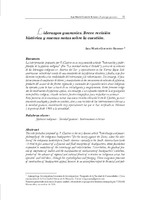Liderazgos guaraníes. Breve revisión histórica y nuevas notas sobre la cuestión
Abstract
La interpretación propuesta por P. Clastres en su muy conocido artículo "Intercambio y poder: filosofía de la jefatura indígena" (En "La sociedad contra el Estado"), acerca de la selección de los liderazgos indígenas en América del Sur -y especialmente en las Tierras Bajas Sudamericanas- intentó dar cuenta de una concepción de las jefaturas dinámica y fluida, cuyo fundamento respondía a las modalidades del intercambio y la redistribución. Sin embargo, el paulatino proceso de cooptación de líderes y manipulación de los mecanismos de selección de jefaturas, producto del avance de los frentes regionales y nacionales de expansión sobre áreas indígenas, ha operado y aún lo hace a través de su cristalización y congelamiento. Estos procesos exógenos de construcción de jefaturas apelan, sin embargo, a un supuesto respeto de la organización socio-política indígena, citando inclusive fuentes etnográficas para respaldar su accionar. Esta ponencia no se encamina a sumar una nueva revisión crítica del texto de Clastres, ya excesivamente analizado y puesto en cuestión, sino a una revisión de las intervenciones externas a la sociedad guaraní, considerando muy especialmente las que se han verificado en Misiones (Argentina) desde 1960 a la actualidad. The interpretation proposed by P. Clastres in his very known article "Interchange and power: philosophy of the indigenous headquarters "(In the society against the State), about the selection of the indigenous leaderships in South America - specially in the South America Low lands - it tried to give account of a dynamic and fluid conception of headquarters, whose foundation responded to modalities of the interchange and redistribution. Nevertheless, the gradual process of cooptation of leaders and the manipulation of mechanisms of headquarters 's selection, product of the advance of regional and national fronts of extension on indigenous areas, has operated -and still does-, through his crystallization and freezing. These exogenous processes of construction of headquarters appeal, however, to an assumption respect to the social and poliical organization of indigenous, mentioning inclusively ethnographies to support their actions. This paper is not directed to add a new critical revision of Clastres' s text, already excessively analyzed, but to a revision of the external interventions to the guaraní society, considering very specially those that have been verified in Misiones (Argentina) from 1960 to the present time.
URI
https://hdl.handle.net/20.500.12219/1663http://www.ava.unam.edu.ar/images/09/pdf/ava09_02_gorosito.pdf
Collections
- Revista Avá [359]




